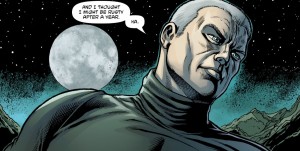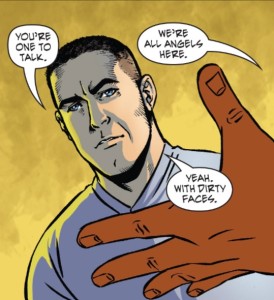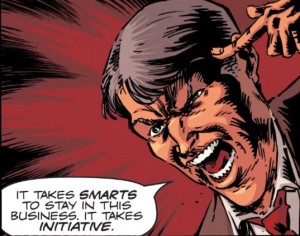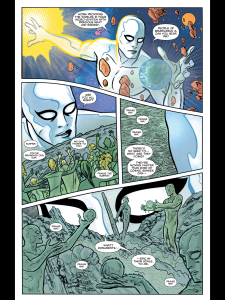Last week I dropped some science on the first week of Comixology’s twenty day giveaway–namely, that I am a god-damned fool when it comes to the cartoonist, Jason.
What will I drop this week, you ask? The answer may ASTOUND YOU.
Join me after the jump, won’t you? Until I learn to trim my critical meanderings (or “word pubes,” to use the preferred term of professional writers), I think it’s better to give people the ability to scroll down our main page and see what’s new…like that awesome Gold Key overview by Graeme from a few days ago. (Yes, I’m linking even though it’s right below me.)
Okay? Okay!
Day Seven
Gravel: Combat Magician #0: Interesting choice from Avatar—I would’ve thought they’d go with the zero issue of Uber¸which has a similarly hefty pagecount but is more acclaimed? Anyway, this is another “zero” issue and one that’s far less cromulent than Archer & Armstrong.
For one thing, in the back it’s got a complete issue-by-issue history of the character (combat magician William Gravel, natch) that is numbered out of sequence. For another, it’s kind of total shit.
In theory, I should be totally down with Gravel: Combat Magician as it has the cheesy, all-too-serious air of terrible men’s fiction—if it had been published as a paperback series from Pinnacle Books, I’m sure there’d be multiple books on my shelf—and I think there’s something both witty and astute in Warren Ellis’ original conceit of taking black magic and bringing it into the world of Tom Clancy-style black ops: not only are covert governmental operations the true definition of “occult” activity, but writers of military and magical fiction can be hilariously tedious in the same way, compelled to catalog every item at their hero’s disposal while also expounding at length about their enemy’s backstories.
So, yeah. I should dig this, is the theory, and yet somehow every issue I’ve ever read of a Gravel comic has been a blood-flecked bore, Ellis either writing or co-writing (or plot-suggesting) from a place of unintentional self-parody, as if he built his own Oblique Strategies deck and used it for every page turn: “Who has the lizard anus?” and “Can the hero smirk about this reversal?” and “What would keep Garth Ennis from laughing at you?”
And yet, all that is secondary to the fact that William Gravel himself is ridiculously dull—stripped of even the crumbs of male self-pity used to make men’s
fiction heroes palatable, Gravel is incapable of doing anything but winning, and unable to do so with anything less than piggy-eyed glee. It’s so utterly Mary Sue-ish one would think William Gravel was Ellis’s 80th level Assassin in the homebrew Top Secret campaign he GM’d himself, except there’s so little innovation on display. It feels more like Ellis is only interested in fanning himself with a handful of paychecks accrued by giving Avatar bragging rights that they’re publishing Warren Ellis at his most extreme.
Anyway, over all the years of stories about tough combat magician William Gravel, Mike Wolfer has gone from being the artist with Ellis writing the stories, to being Ellis’ co-writer, to now being the solo writer. My hope is that Wolfer can continue this progession and in a few years time either be the actual subject of the book—Wolfer: Combat Magician has a certain ring to it. The alternative–Wolfer taking over the rest of Warren Ellis’ career–is kind of grim, even to me.
This zero issue shows Wolfer’s learned all the right lessons from the Master—Gravel shows up at a spelunking expedition in Iceland to “slot” an evil government official, kill the men hired to protect him, defeat a French combat magician, and pull the skin and bones off an enemy, all while falling just one “bangers & mash” short of uttering a British Character Bingo.
As a zero issue, it does indeed introduce new readers to the character, and it does indeed let them know what to expect in future issues (skeletons, smirking) but…man. Double-plus ungood. Makes Tarot: Witch of the Black Rose seem like Gasoline Alley.
Day Eight
WWE Superstars #1: One weird-ass wrestling comic, courtesy of Super Genius Comics (an imprint of Papercutz), writers Mick Foley (wrestler) and Shane Riches (not a wrestler, despite having one of the more nom de wrestle-ier names I’ve ever encountered), and artist Arlitha Martinez, among others (the lettering is by Tom Orzechowski (!!)).
A crime comic set, according to the intro page, “in an unforgettable noir landscape” (which I think conveys the level of reserved understatement permeating the writing overall), WWE Superstars #1 follows three wrestlers (John Cena, Randy Orton, and CM Punk) through each of their direct-to-video thriller plots: Cena is an ex-cop who’s just done time and is the only one who can find a briefcase containing ten million dollars; Randy Orton is on his way to becoming D.A. if he can just stop the mysterious graffiti artist writing “YES” all over his car and campaign stops; and C.M. Punk is a vigilante trying to take back the city by…throwing a rally? The dramatic hooks kind of amp down dramatically, you’ll notice.
I’m a half-assed fan of Mexican lucha libre—thanks, Los Bros Hernandez!—but modern wrestling stuff leaves me cold, so take this review with a block of salt. That said, even if I devoted tens of thousands of words, I could not begin to touch how terrible and inadvertently hilarious this book was. Almost everything I don’t like about wrestling is here—internecine feuds; interchangeable personalities; a negligible grasp on reality; endless posturing—but amplified to a truly stunning degree. The writing strings clichés together in ways I’m still recovering from. Here’s a caption, written from Punk’s POV: “We’re all sitting on a powder keg. The blowback from Cena’s release has tensions high. Ten million reasons why every idiot with aspirations for power will be gunning for him.” There are three different clichés relating to guns and gunpowder in one caption! And I don’t think the writers even noticed!
And on the same page Punk gets jumped by the Wyatt Family, who are described as “a cult of the worst kind” which…I don’t know. Doesn’t “cult” have enough terrible connotations on its own? (I mean, technically speaking, isn’t the worst kind of cult one where everyone commits suicide for no reason? Is the Wyatt Family a suicide cult? Are these guys ghost wrestlers?) Anyway, one of the Family says “When men of power wage war, only the innocent suffer. Down with the machine.” To which, Punk replies: “I run from nobody.”
I guess maybe that would be great if you followed wrestling and knew these were the character’s big catchphrases—that is what’s going on, right?—but even so…isn’t it like if you had an issue of Marvel Team-Up where the Human Torch greeted Spider-Man with “Flame on!” and Spider-Man replied with “With great power comes great responsibility!”?
I’ve read this book three times and there’s still dialogue where I have no idea what’s being conveyed. Although the five pages of character photos and description helped me assemble who’s who, I’m still a little shaky on the what’s what, especially when descriptions run in the vein of “The Brothers of Destruction: Kane and Undertaker. Not corrupt but not on the up-and-up either.” What does that even mean? I feel like Norman being shut down in that Star Trek episode: “if they’re not corrupt, then they’re on the up and up, but…if they’re not on the up-and-up, then they must be corrupt…”
There are at least fifteen characters introduced in this issue, provided your definition of “introduced” means “appeared in this comic with no context other than their visual appearance.” And apart from the flexing, posturing, and occasional facebuster, most of them share some variation of an almost touching need for bourgeois achievement: Cena’s money (ten million dollars); Orton’s high-exposure desk job (seriously, two wrestlers are running for D.A.—what kind of legal accreditation does one need in Titan City?); Punk’s gentrified landscape. All we need is a wrestler on a deadly quest to achieve affordable health care, and maybe another trying to drum up a design team to work on their game-changing smartphone app (“I call it Soup-Plex, see, because it’s like a version of Grindr designed especially for soup kitchens”), and you’d have the current version of San Francisco’s middle class, albeit a tad more Human Growth Hormone-ier.
So, yeah. In a certain light, this can be seen as free comics gold. I’ve “read” it at least four times to try and describe the insanity that is reading it, and now that I’ve tried (and failed!), I’ll probably read it at least that many more. For me, this is the comic book equivalent of those Hellraiser puzzle boxes—I keep picking at it and picking at it, despite every likelihood that truly understanding it will only result in me being dragged off to Hell.
Day Nine
Lola XOXO Vol. 1 #1: I don’t follow Aspen books, and this book seems like decent proof I’m smart to do so. Siya Oum’s illustrative style is lovely—it reminds me of Francisco Solano Lopez’s work a little, though by way of Michael Turner and Margaret Keane—but the writing is, um, a little terrible? Even assuming this book has been translated into English from its original language—which I don’t think is the case?—the story, about a young girl trying to find her parents after being separated from them by the world’s mildest atomic apocalypse a decade earlier, reads like a thirteen year old girl’s Revolution fanfic with the serial numbers filed off.
Maybe that’d be awesome if I was ten year old girl, but actually I’m a bit unsettled about how unthinkingly Oum seems to have absorbed the male gaze POV—Lola sets out in a bustier, jean shorts and fishnet stockings to search for her parents, for example. I kinda doubt I’d pass this along to my niece to read when she was around that age.
Anyway, looks pretty, reads terribly but not in WWE Superstars’ “so terrible, it’s amazing” way: It’s more like in that “so terrible I hope the creator doesn’t read this review but works very hard at their craft anyway and teaches themselves to write something better” kind of way. (IGNORE ME!, in other words.)
Day Ten
Anti-Hero #1: Jeff’s Calvacade of Crabbiness continues with this superhero/crime hybrid from writer Jay Faerber, artist Nate Stockman, colorist Paul Little, and letterer Charles Pritchett. (To paraphrase good old John Kane: “Comics! Sometimes typing out all the names is wearying!”) Callum Finney is a craven mob henchman who stumbles onto a great break—he learns the secret identity of the city’s top superhero, Paragon. The first issue shows us exactly that, ending with Finney confronting Paragon’s secret identity to blackmail him into doing Finney’s bidding.
It’s a good hook for a superhero story, especially if the characterizations of both Finney and Paragon develop in later issues. Unlike Foley and Riches, Faerber knows how to make by-the-numbers scenes do what they’re supposed to. And while Stockman’s work is no Bill Willingham on Elementals (or even Villains & Vigilantes, really) it does the trick.
All that said, I found most of the scenes with Henry, Paragon’s secret identity—being a good hero has made him a terrible husband, father, and employee—shrill and tedious, and Faerber’s one-note dialogue and Stockman’s melodramatic staging were equally to blame. But are those scenes really any worse than similar ones Waid puts in Irredeemable, all the issues of which I recently devoured like so much bargain Easter candy? Unsure if I really liked the hook or I just felt terrible about the depth of my mouth-to-gift-horse scrutiny, but I picked up issues #2 and #3 to see how things developed. At ninety-nine cents per, I figured I wouldn’t really be out much of an investment if it didn’t get any better.
And…it didn’t. The page count for the two issues was lowish (not at all bad for the price, mind you) and Faerber and Stockman keep the number of fight scenes high (probably sensibly for a serialized digital book) so the scenes of Finney and Henry together were few, but also felt perfunctory and flat. (“Hey, I’m not a bad guy!” *glare* “See, I told you I wasn’t a bad guy!” *glare* [lather; rinse; repeat.])
Maybe it’s the kind of thing that might work for you? I’m kinda bummed it didn’t for me.
Day Eleven
Letter 44 #1: You probably remember Graeme talking about it on the podcast—incoming President Stephen Blades finds out the previous president’s blatant warmongering and poor economic choices were made after discovering a potentially hostile alien intelligence between Mars and Jupiter. Now, the new President must figure out what policies he should continue in the face of such devastating knowledge, even as a nine person spaceship sent up three years ago moves in to discover what they can about the alien presence.
I think if you have just the right mix of cynicism and naiveté, this Oni series from Charles Soule and Alberto Albuquerque might really ring your chimes? Certainly, there’s a very dark wit inherent in Soule’s premise—what if George W. Bush was right? Because, you know, aliens?—and Albuquerque’s art kind of reminds me of Aeon Flux’s Peter Chung, but to be honest it just kind of bummed me out.
As Jill Beaton points out in her editorial, Barack Obama has continued to strengthen programs started under Bush. What she doesn’t point out is that those programs include not just mass surveillance of the citizenry, but also drone strikes, the destabilizing of foreign democracies whose interests conflict with ours, and the assassination of Americans without trial. So I read Letter 44 with less of a “Ooo, it’s like Independence Day written like the West Wing!” and more of a “Why don’t they just call it ‘Democracy, Ha Ha Ha’ while they’re at it?”
It’s well-done—very well-done, probably—but, as I complained earlier about Van Lente, I don’t sense much personal commitment from Soule about the whole endeavor. The guy’s a professional, and this is professional work and a really good free comic, but I’m not sure if the creators feel anything more strongly than “hey, this captures the zeitgeist in a way that would make a great TV pilot!”
I don’t know. Maybe it’s post-snack blood sugar turning me into Spongejeff Sourpants, but I’m clearly more down than up on this one.
Day Twelve
Silver Surfer #1: Water in the desert! Food for the starving! After all this naysaying, it feels great to talk about a book I liked. Even before this came out, Graeme pointed out Dan Slott and Mike Allred’s take seemed very Dr. Who-esque, with The Silver Surfer protecting innocent alien civilizations even as a young woman from Earth becomes involved in his cosmic adventures.
But that didn’t make me like it any less: one or two punchlines aside, Slott kept the Surfer very much in character, and he apparently knows how to script for Allred—for a few images and ideas, that Allred pop gloss seems disquieting, like a cheap carnival with a genuinely dangerous ride hiding behind the manufactured excitement.
Sure, it’s on the precious side (there are twin sisters named Dawn and Eve, and it wouldn’t really surprise me if they end up being the same person via temporal blabbity-blab), but if Slott wants to take a swing at writing Neil Gaiman-esque space and time adventures by way of Marvel trademarks, I’m loathe to begrudge him…at least when it’s as well-done as this.
Very strong first issue and I’d more than likely pick up the next (if I wasn’t still conflicted on how to handle buying stuff from Marvel…but that’s a column for another time, probably).
NEXT WEEK: The Crabby Conclusion!!






This Jeff, this:
“Ellis either writing or co-writing (or plot-suggesting) from a place of unintentional self-parody, as if he built his own Oblique Strategies deck and used it for every page turn: “Who has the lizard anus?” and “Can the hero smirk about this reversal?” and “What would keep Garth Ennis from laughing at you?””
was a touch of pure genius ‘Who has the lizard anus’ is my new all purpose oblique strategy.
Also, glad to see you mention the disquieting vibe that is veined through Allred’s ‘pop’ art. I’ve always been kind of disturbed by it – like an insect that has markings that look like a human face. It’s why he was such a perfect fit for Milligan’s X-Force/Statix (the last *really* essential Milligan).
Too often people just talk about Allred like he’s just this joycore pop-artist. Simply not true.
Thank you, Beast! I really wish I’d had the wherewithal to p’shop “Who has the lizard anus?” onto an actual oblique strategy card. I suspect it’d prove useful for a lot of us.
>Callum Finney is a craven mob henchman who stumbles onto a great break—he learns the secret identity of the city’s top superhero, Paragon.
This sounds uncomfortably similar to the premise of Faerber’s Venture. Then again, if Ellis can get away with filing the serial numbers off old Hellblazer & Transmet stories for decades, perhaps any number can play.
A salute to Spongejeff Sourpants the dean of comic book reviewers! You might want to consider adopting that moniker for the podcast.
Your reviews were hilarious and hugely entertaining. WWE Superstar #1 sounds like being worthy of serious comparison to an Ed Wood movie in that it is so bad that it has to be the product of a demented form of genius.
I think my favourite passage in your post is:
That said, even if I devoted tens of thousands of words, I could not begin to touch how terrible and inadvertently hilarious this book was. Almost everything I don’t like about wrestling is here—internecine feuds; interchangeable personalities; a negligible grasp on reality; endless posturing—but amplified to a truly stunning degree. The writing strings clichés together in ways I’m still recovering from.
You made my day with your wit, Spongejeff.
I love the fact that the success of the Patreon campaign has given us an opportunity to read weekly reviews from you and Graeme. There has been some great material between your take on the Comixology free comics and Graeme’s assessment of the critically over praised MPH. Keep up the great work.
Thank you, Paul. I doubt I’ll adopt the monicker, however–for one thing, I think I’d sound too much like a wrestler!
Huge fan of the show and your reviews. Just commenting here to point out that my bookmark and tab for this site call it What, What? No big deal but thought you’d like to know.
Thank you for the comment and the compliment, Jim! I’ll go under the hood and see if I can get that fixed–although, really, the more accurate version of that metaphor would be “pop the cigarette lighter in and out once or twice and see if that does anything.”
Another quick reply–I think I fixed it? Lemme know if not. Thanks again, Jim!
You got it.
I literally laughed out loud (llol) a few times reading each of these reviews.
Liked the Gravel review a lot, Jeff. Like you I was thinking that Ennis could breathe life into it, or at least come up with more than one magical gnarkill. I mean, pulling people through cave walls twice? And that recap catalog at the end was crazily slapdash! I never read an issue before that #0 and now I’m sure I won’t. Some semblance of competence would go a long way for Avatar.
This was a rough bunch of comics for the most part.
It seems like the Silver Surfer will succeed or fail for individual readers based on how much they value Mike Allred’s art. I absolutely love Allred, but Slott’s script left me cold; as you mention, the stuff with Dawn and Eve is so on the nose that it’s distracting, and for me a bit patronizing (“Her sister travels the world! She stays at home! But now she’s the one who goes across space with the Silver Surfer! What a wacky irony!”) An emotional connection to the audience is especially important for a cosmic book, and something with which many cosmic stories don’t even bother. The heavy-handed characterization here, however, isn’t good enough for me.